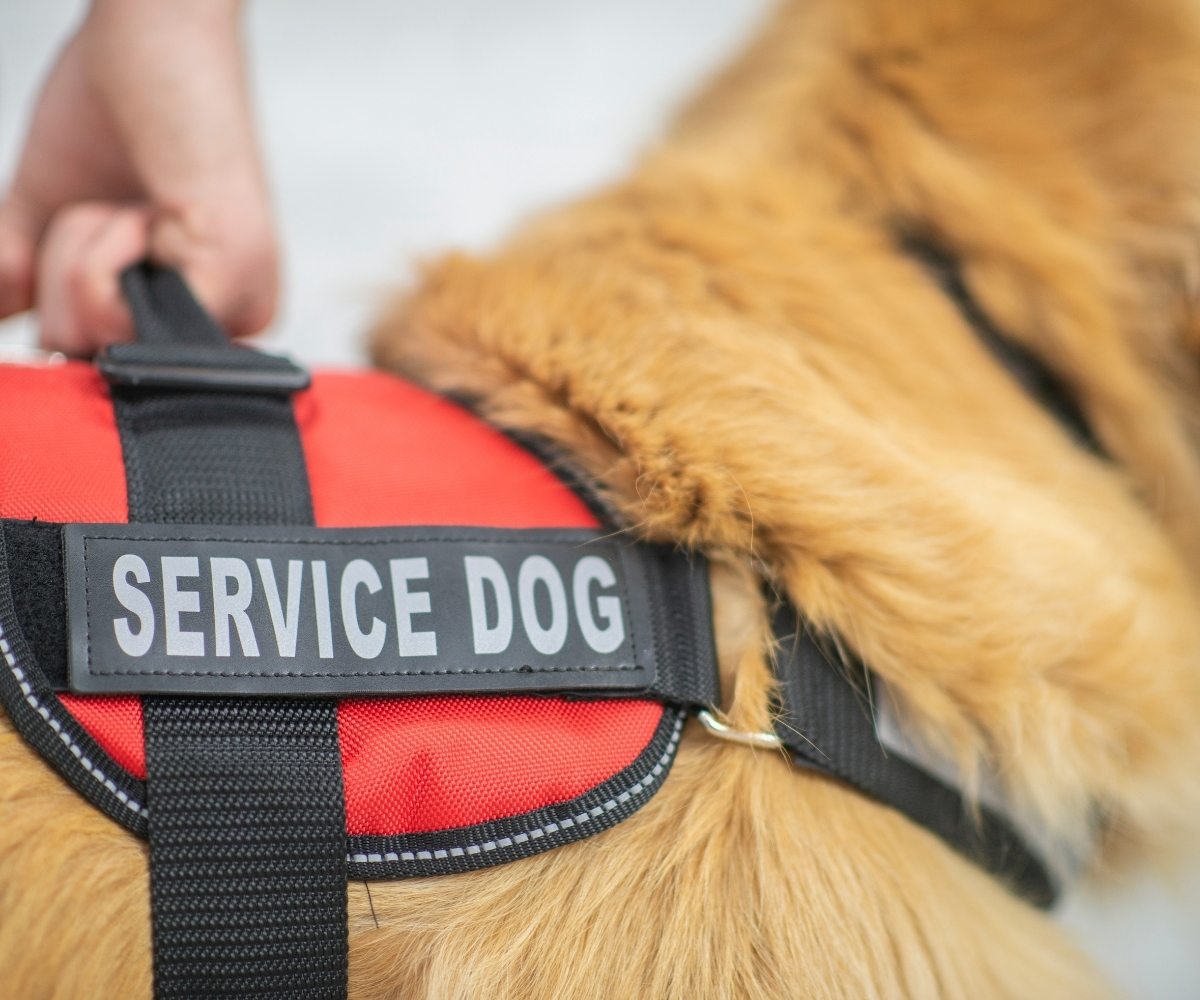
All You Need to Know About Psychiatric Service Dogs
- Published on:
- By: ASP Team
What is a Psychiatric Service Dog? Do you qualify for one? How do you get one? If you have any of these questions (and more), this article is for you. The world of Service Animals can seem complicated to navigate, but ASP is here to help. Let’s explore all you need to know about Psychiatric Service Dogs.
What Is a Psychiatric Service Dog?
A service dog helps a person with a disability live more independently. Disabilities come in many forms including psychological. A Psychiatric Service Dog assists with psychological disabilities and aids its owner in the same way that any other Service Dog would. The Americans with Disabilities Act (ADA) defines a Service Dog as “a dog that is individually trained to do work or perform tasks for a person with a disability.” Unlike Emotional Support Animals, PSDs must be trained. Emotional Support Animals provide comfort to their owners through unconditional love and affection. Psychiatric Service Dogs are trained to take a specific action, whenever required, to mitigate symptoms of mental impairments. This means they perform a very specific duty so that their disabled owner can safely go about living in everyday ways.
Thousands of Service Dogs across the nation serve people with varying disabilities. Their assistance can help on multiple levels to improve key aspects of their owners’ lives. It is a wonderful thing for these individuals (and their dogs) to experience such a beneficial relationship that allows them to thrive in otherwise challenging circumstances.
Who Specifically Qualifies for a Psychiatric Service Dog?
If you suffer from a mental health disability that impairs one or more major life functions, you are a good candidate for a Psychiatric Service Dog. The ADA does not specifically define these “major life functions” but they cover a significant range of actions. Disabilities that can qualify for a Psychiatric Service Dog include:
- Clinical depression
- Anxiety disorders
- Phobias
- Post-traumatic stress disorder
- Attention-deficit/hyperactivity disorders
- Bipolar disorder
- Obsessive-compulsive disorder
- Autism
This list is not exhaustive, however. Psychiatric service dogs are indispensable to their owners.

Get Your ESA Today
ATTENTION
Due to the new Department of Transportation (DOT) policy, Emotional Support Animals are NO longer allowed to fly in airplane cabins for free. However, Psychiatric Service Dogs are eligible.
How Can a Psychiatric Service Dog Help?
Psychiatric Service Dogs can be trained in a wide variety of tasks that assist their owners! Here are just a few samples of what a PSD is capable of performing.

● Balance Assistance – Providing stability when walking for those that may have to take a more sedative medication to stay calm.
● Find a Person/Exit Strategy – Severe anxiety can be disorientating in a large crowd or new environment. A PSD can be trained to locate emergency personnel for assistance or to identify the nearest exits to direct their owner out of harm’s way.
● Grounding – A PSD can help reorient their handler back into reality or a present state of mind during PTSD or panic attack episodes.
● Medication Assistance – A PSD may physically bring medication to their owner or give specific cues as a reminder to take them.
● Interruption & Redirection – A PSD can help alleviate obsessive-compulsive and self-destructive behaviors by interrupting, redirecting, or comforting with responsive touch.
● Buffering – A PSD can provide a buffer between individuals in crowded areas or retail lines. They will often circle their handler and ensure enough space is provided to keep stress levels manageable.
● Room Sweep – A PSD can be trained to check a room ahead of its owner to alleviate fears of impending dangers. This can be necessary for hyper-vigilant individuals who have usually suffered a trauma of some kind.
● Healthy Routines – A PSD can bring stability to daily routines by now allowing oversleeping, motivating their owner to exercise, or by reminding them to do daily tasks like drinking enough fluids.

● DPT & Tactile stimulation – A PSD can use nudges or gentle pressure across their owner’s body to induce calm, comfort, and encourage breathing exercises for handlers in emotional/mental distress.
How to Get a Psychiatric Service Dog
Any dog can become a Service Dog with proper training. You can acquire your canine companion from a breeder, rescue, or shelter. It is important to look for an animal that does not display aggression or come with emotional traumas of its own. These characteristics would make it difficult to train a dog for the service you require.
There are no breed, size, or age requirements/restrictions when it comes to Service Dogs. The main indicators to determine whether a dog would be a good match for service status are temperament, obedience skill level, and social intelligence. Many dogs have natural talents that allow them to evolve into wonderful professional companions. If you have a dog with potential, consider preparing your dog to take the American Kennel Club’s Canine Good Citizen (CGC) Program. This program can give your dog a boost towards becoming the Service Dog you need and desire.
To train your dog you’ll need patience and dedication, but it can be very rewarding and beneficial to take this route. Both the ADA and the DOT’s rules permit owners to self-train their Psychiatric Service Dog. If you don’t have the capacity to train your dog, however, you can hire a professional trainer or find an organization that specializes in doing so. There is no “official” training program for Service Dogs, but there are respected and well-versed institutions that offer ample guidelines and suggestions.
No matter the reason that you own a Psychiatric Service Dog, you have a right to privacy and respect when it comes to your disability. Under the ADA, the only permissible questions an individual may ask are:
(1) is the dog a Service Animal required because of a disability?
(2) what work or task has the dog been trained to perform?
You do not need to give any specifics or have your animal demonstrate tasks in any way.

TOP 3 FREQUENTLY ASKED QUESTIONS
1. Where is my Service Dog allowed to go?
A PSD has access to all of the following:
● Housing / Lodging – apartment buildings, condos, co-ops, rentals, hotels,
college dorms, short term rentals (Airbnb)
● Transportation – airplanes, taxis, and trains
● Public Areas – restaurants, bars, university campuses, offices, libraries,
beaches, stores, parks, markets
HOUSING
PSD owners also have the right to living accommodations with their dogs under the FHA (Fair Housing Act) . Owners of PSDs are exempt from paying fees or deposits to their landlord or housing authority.
TRAVEL
In addition, through the DOT’s air travel regulations, PSDs are allowed to accompany their owner in the cabin of the aircraft, free of charge. Beginning in January of 2021, air carriers are allowed to ask PSD owners to submit a signed certification form when booking their flight. The form requires the owner to acknowledge and confirm that their Psychiatric Service Dog must be (and has been) trained to assist with a disability and is capable of appropriate behavior including relief protocols. More specifics on flying with your Service Dog can be found here.
PUBLIC ACCESS
Psychiatric Service Dogs have all the same public access rights as any other Service dog. Under the ADA, your Service Dog is allowed to go any place the public is allowed to go. Government buildings, places of business, and retail stores, and other organizations that serve the public must legally allow Service Dogs to accompany their owners.
No matter where you take your PSD, however, it’s always important to remember that you (as the handler) are responsible for their actions at all times. If your PSD is misbehaving it can be asked to leave the premises. Service animals can be denied entry if they are acting aggressively, barking or growling repeatedly, or causing an unsanitary condition. A psychiatric service dog has to be under the handler’s control at all times when out in public.
These are some key milestones an owner should track when deciding whether their Psychiatric Service Dog is ready to be of service in public:
● Can the PSD remain calm and dismiss distractions including loud sounds, traffic, and crowds?
● Can the PSD sit, stay, shake, and heel efficiently?
● Does the PSD remain focused on their handler rather than other people and animals?
● Is the PSD able to maintain composure in the presence of food and treats?
● Does the PSD bark or growl inappropriately?

These are some basic tests your PSD should be able to pass without a doubt before going out in public. A PSD that is not in control will not be able to perform the necessary duties needed to assist its owner and can create issues for others around them.
2. Do I need to identify my Service Dog as such?
Outside of travel regulations, there are no laws that require your Psychiatric Service Dog to be visibly identifiable. Many owners find that visual aids such as harnesses, vests, and ID tags are useful to quickly and easily determine that their dog is a working animal. Having these items can be helpful for PSD owners especially because they suffer from invisible disabilities. Having their PSD outfitted with appropriate paraphernalia helps limit undesirable approaches from strangers or inappropriate questions from “inquisitive” individuals.
Additionally, PSD Letters can be very useful. Presenting a formal notice from a licensed healthcare professional greatly decreases your risk for pushback from housing authorities or public establishments. A PSD letter clearly outlines that there is a disability-related need present, in which the assistance of a Psychiatric Service Dog is required. Let’s be clear, however, that accessories or letters alone do not make your dog a PSD. Faking a Service Dog is a very serious thing.

3. How can I register my Service Dog?
If you have (or need) a Psychiatric Service Dog, you may benefit from voluntarily registering with American Service Pets and obtaining service animal accessories. Under ADA rules, registering a service animal does not grant legal rights, but as previously stated, certificates and registrations are routinely used by owners for personal convenience.
Psychiatric disabilities are most often invisible to the naked eye. Having an easily accessible method for strangers to instantly associate your animal as a Service Dog can bring a lot of stress relief. Housing/Travel Letters, vests, ID cards, harnesses, and other service animal gear are intended to help you enter public spaces with confidence. These items also protect against potentially unsafe advances by individuals and children who may not know your PSD is more than a pet. Service Dog Certifications store your Psychiatric Service Dogs information in its database for easy retrieval and issuance of the proper ID card, certificate, or vest, depending on your needs. The PSD packages offered by American Service Pets also include training assistance!
Steps To Take:
1. Contact American Service Pets to answer all of your questions!
2. Submit the online questionnaire (or complete it via phone with a customer care representative) to verify your qualification.
3. Choose the package options that best fit your needs.
4. Wait for review and approval from a partner licensed healthcare professional in your state of residence.
5. Receive your products (typically) within 48 hours!

You can breathe a little easier knowing that we’ve got you covered. There are many available resources online for task training, but ASP also provides a handy guide along with regular tips and tricks to get you on your way. We are here to help, and it is always our pleasure to serve those in need.

The benefits of an Emotional Support Animal certification and a Psychiatric Service Dog certification are drastically different. Fortunately for you, American Service Pets’ network of active board certified doctor or other licensed mental health providers can help you find the right path to certification. To find out whether you need an ESA or PSD letter, take our easy, three-step Pet Owner Survey!
More Great Resources




